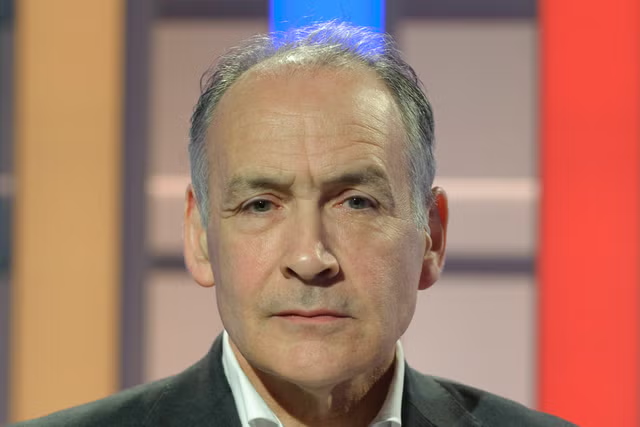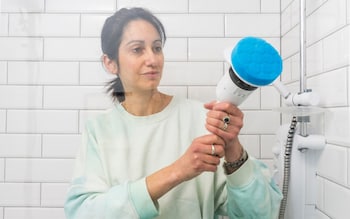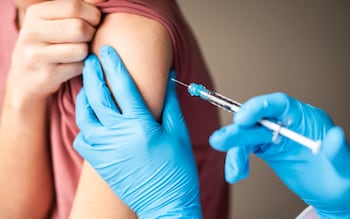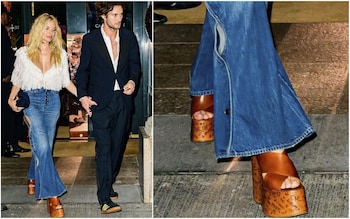With my first step into the shabby chic studio space I’m greeted with a handshake so firm it would make Thor wince. In the room above a backstreet near the Olympic Park in east London, men in their gym kits are talking and, more significantly, hugging. They have only just met. This is the introduction session for Mens Day, a programme of activities dedicated to male connection, openness and vulnerability. I have my name tag and I have concerns.
Mens Day (there’s no apostrophe - don’t ask) was created by Benjamin Davies, a 31-year-old from South Africa, who spent, by his admission, “six gap years” doing various jobs until he settled in London in 2019, where he combined his experiences as a life coach to focus on the wellbeing and health needs of men.
“I need this day and it turns out other men do too,” he says. “I was in my London flat in 2022 and I was lonely and didn’t know how to cultivate the sense of community I’d known in Grahamstown [now known as Makhanda]. So it was a brainwave – why don’t I just create that space where men can come and spend the day doing all the things I love.”

If Ben was one of the X-Men his superpower would be raw positivity. As the day rolls on, his charisma is obviously appealing to this disparate group of 15 men, all looking to open up in the glow of his relentless boosterism. “Men are being asked to change and I think that’s great but we need to be able to practise that change in safe spaces in order to do it outside.”
The first person I speak to is Dale, a 29-year-old banker from Victoria in British Columbia. “What’s important about being in a men’s space is that we all have the same objective, which is to share and be open,” he says. “It’s scary to be vulnerable and sometimes if you’re being vulnerable with someone who’s not open to receiving it then you both retreat back.”
I’m provided with an icebreaker codeword and instructed to find a partner who has the codeword to match mine. I am approached by Paul, 41, who is from London and works in insurance. Coincidentally – or perhaps cosmically – his codeword is the one I’m looking for. I have “crows” and he has “murder”. A bit dark maybe, but the shadows don’t last.
“There is a massive need for this kind of thing for men now,” says Paul. “The release that is offered for a lot of men in the UK is to go to the pub, drink a lot, watch the football, and maybe get some stuff out that’s not really what you want to talk about. Whereas here you have the full range of places to go to – even dark places – and get them off your chest.”
When I told my wife I was doing this she spat out her tea. As someone who received a “highly commended” rosette at Britain’s most cynical man competition this was a high-risk assignment for me. But every time I retreat into a default defensive posture, Ben’s enthusiasm brings me back to the light.

It is important to state this experience is not attended by brooding anti-feminists or conspiratorial misandry obsessives. Quite the opposite. The obsession of Mens Day is not toxic masculine power but making connections. “Learn the language of vulnerability and learn that vulnerability is a strength,” says Ben.
Diverse in age and background, what the men share is an urge to be free of judgment – both of themselves and by others. Bereft of the opportunity to articulate their feelings under the normal pressures of the working week – or simply unequipped to do so – they want to stop the world for a moment and look within. To what extent this is a result of a culture that either debases the traditional roles of men or is debased by men themselves – the Andrew Tates of this world – can only be guessed. But the one statistic that won’t go away is that suicide is the biggest killer of men under 50 and men make up three-quarters of those who take their own lives.
“The biggest risk factor is loneliness,” says Ben. “To say ‘I am lonely’ feels like the most emasculating thing a man can say. It’s no wonder it’s such a risk factor.”
Such grim thoughts are put to one side for the first activity of the day, a session of breathwork designed to take you to a point where you don’t feel you can continue, so when you push through that it can release blocked energy. The shakedown that follows provides the opportunity to dance, which I politely avoid. Ben, by contrast, goes slightly berserk. I am rather too aware of my own sheepishness and that this day has been designed to break down the sort of awkward, cultivated “blockages” that have served as my props for so many years. I am spared further self-examination by joining the queue for the ice bath.

Eventually stumbling out of a paddling pool of frozen water, which has been assembled on the metal stairs that overlook a canal, I bump into a shivering Paul again. “In my interactions I’m thinking about how they’re affecting other people and how I can serve or help others,” he says. “I didn’t focus on my own happiness. So events like this are for me to take time for myself. After a bad break up a couple of years ago I dialled into fitness a lot more, sound baths, ayahuasca ceremonies.
“They put a focus on me being the person who is choosing that instead of being in a group at work or a friends group you’ve been in for 25 years that you don’t even like anymore.”
Half-an-hour of high intensity training follows the ice bath, which has generated the rush we all hoped it would (“the sting is the thing”), although this ends with resistance work that involves touching other men and trust exercises on the cold concrete floor. I grin and bear it. Ben sits us in a circle to discuss how the morning is going. One man explains he is here to help fight his depression. Another says he just wants to make friends and promises to come to the next session (there are plans to open a Mens Day in Manchester and Devon in the autumn).

Ben stresses the need to be “interested rather than interesting”, a concept many of the men return to again and again throughout the afternoon as the most powerful message of the day. Being uncharitable, you wonder why this expression was such a revelation – as if no one had ever told these men they had to think about anyone else before. But I don’t think that’s fair. They want to grow and they want to understand themselves better.
After lunch we separate into groups of three and each ask two questions from a list of 27 options. These vary from “What keeps you awake at night?” to “How do you define happiness and what brings you joy?” Our answers are suitably candid and unexpurgated. The purpose is to know your partners better by thinking about what question would bring out the most from their answer. One of my partners is Fame, 48, who works with tech. “I have a friend network and most of these I met in my career,” he says. “You don’t have those deep conversations – you don’t reach the level you reach here. Mentally I feel like I can open up. It takes away all those dark fears and having them build up within me.”
Next comes what Ben calls “play”, an attempt at instant childhood regression by making up games with balls, foam sticks and a frisbee. The idea makes sense but – even after what we’ve been through since 9am – asking 15 men to transform themselves into free-spirited tweens feels ambitious. Similarly, the visualisation exercise comes at the end of a day in which most of us are exhausted. Ben’s narration takes us through a cave and a forest and all the topographical features you would expect. The experience is overlaid with a sound bath of gongs and singing bowls, the effect of which is so overpowering the man on the mat next to me falls asleep and snores through the whole experience.

We assemble in the circle for the final debrief. Each man is applauded for his efforts. A young man called Macaulay, who Ben explains to me later has had some tough experiences, including what he calls “negative male influences“ says Macauley, “I pledge to continue to work on myself and welcome the skills of vulnerability and acknowledge the growth I have had from coming to Mens Day. Old friends can see the benefits I’ve got from doing these and the benefits have been profound.” It is the most affecting moment of the day, laced with melancholy, resilience and hope.
So the quest for “brotopia” goes on. As the late Sunday afternoon sun sinks over the Olympic Park arenas, Ben’s programme has had an emetic effect. The men look cleansed, speaking ever more freely, smiling and laughing with a bounce from the balls of their feet. By the time I’ve finished packing my gym bag, several of them have already agreed to meet again.
“Men need spaces like this and if I’m the person to provide them then that’s my job,” he says with an irrepressible grin. “I’m so grateful to do this work. I love it.”
Disclaimer: The copyright of this article belongs to the original author. Reposting this article is solely for the purpose of information dissemination and does not constitute any investment advice. If there is any infringement, please contact us immediately. We will make corrections or deletions as necessary. Thank you.



